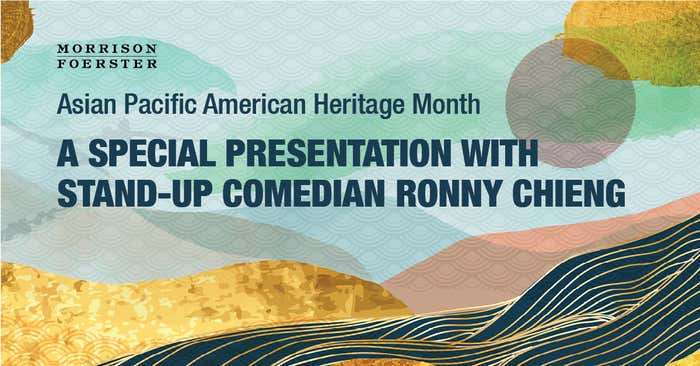
As part of our month-long celebration of Asian Pacific American (APA) Heritage Month, MoFo welcomed stand-up comedian—and law school graduate—Ronny Chieng for a virtual conversation about Asian identity, while tackling some of the issues facing the APA community with a bit of humor.
Litigation partner in the New York office Haima Marlier, who is the partner-sponsor for the New York Women Attorneys of Color Affinity Group and a liaison for the firm’s Asian Affinity Network, introduced moderator Rich Hung, co-chair of the firm’s IP Litigation Group and partner-sponsor for the San Francisco Asian Attorneys Affinity Group.
Ronny is a stand-up comedian and actor who was born in Johor Bahru, Malaysia. He was raised in Manchester, New Hampshire and Singapore, and started performing comedy in Melbourne, Australia. In 2015, he joined the cast of Comedy Central’s The Daily Show and his Netflix special, Asian Comedian Destroys America, debuted in 2019. He also starred in the hit film Crazy Rich Asians and is currently working on his sitcom, Ronny Chieng: International Student, which he co-writes.
Rich opened the conversation by asking Ronny about his educational background and why he chose comedy over going into law. He responded with the very frank answer, “I was really just a bad law student. I couldn’t get hired at a firm to save my life and, thankfully, the barrier of entry for open-mic comedy is basically zero.” In fact, he recalled applying to an internship in MoFo’s Singapore office in 2008, and still had the email to prove it. On making the decision to pursue comedy over law, Ronny recalled that he didn’t tell his parents right away because he was still studying to take the bar—which he passed—when he first started his career.
With his diverse background, having lived all around the world, Ronny’s view of his own cultural identity is an interesting one. “Culturally, I feel at home everywhere…Yes, I identify as Asian, but what’s funny in America is that we kind of use ‘Asian American’ as if it were a means to create a powerful voting block because the disparate proportional races were too small to have any kind of political power. But we know that Asian people are all very different,” he remarked.
Ronny also touched upon some of the cultural aspects of being Asian that Americans have a hard time understanding, such as the difference in dialects, traditions, and micro-cultures, and where there is perhaps room for more education. He was also asked about referencing Asian culture in comedy and entertainment and how to find the fine line between funny and offensive, stating that “Everyone wants the legal test for ‘this is funny’ and ‘this is crossing the line,’ but there is no legal test because it’s an art form…It’s a skillset that needs to be developed. And sometimes the point is to cross the line because you are trying to say something important and you’re trying to make an impact.”
Rich and Ronny also talked about the hard and soft skills that could be taken out of law school and applied to performing stand-up comedy, Ronny’s thoughts on Asian representation in the entertainment industry, the challenges Ronny faced entering the American and Australian market as an Asian comedian, and how he decides when and how to joke about race.